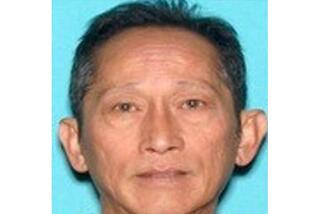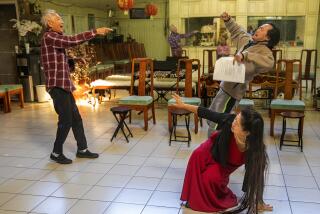Sign of Remorse? : Lam, in Jail Interview, Reveals That He Wept After Cooperman Slaying
In a jail house interview one day after his murder trial ended in a hung jury, Minh Van Lam said he wept after “accidentally” shooting to death his friend, Cal State Fullerton physics Prof. Edward Lee Cooperman.
The 21-year-old Lam said he cried on the shoulder of a female campus police officer--a sign of remorse that even Lam’s attorney says he did not know about.
During the trial, the prosecution portrayed the shooting “as a cold, calculated murder,” but the defense maintained that Lam accidentally killed his friend and mentor. Cooperman’s widow said that when Lam telephoned her from jail three days after the shooting to say he was sorry, he showed no remorse and his demeanor was flat and unemotional.
‘Inconsistent’ Statements Claimed
Cooperman bled to death in his cramped, sixth-floor office in the university’s Science Building on Oct. 13, 1984, and Lam was arrested several hours later after police said he made “inconsistent” statements about the shooting.
The university police officer, Sgt. Teddy Rasmussen, could not be reached for comment Wednesday. During her trial testimony, however, she made no mention that Lam appeared to grieve over the shooting.
“No one ever asked her: ‘Did he in fact ever cry?’ ” defense attorney Alan May said Wednesday. “This was probably one of my blunders. I would have asked if I had known the answer was in the affirmative.”
May said that if the Orange County district attorney’s office decides Friday to retry the case, he “probably” will call Lam to testify. In the first trial, Lam did not take the witness stand. May also said he will ask Rasmussen whether Lam cried.
“As a young Vietnamese man, he’s (Lam) been trained not to show too much emotion in public,” said May, adding, however, that when Lam discusses the shooting, his emotions are often discernible.
Jurors in the trial, in a unanimous vote during deliberation, said they felt Lam was innocent of premeditated murder.
May said Wednesday that the jury’s votes during deliberation indicated that they had “rejected a willful killing.” Jurors also voted 11 to 1 for innocence on voluntary manslaughter, but were divided 7 to 5 for guilt on second-degree murder and 9 to 3 for guilt of involuntary manslaughter.
Second-degree murder and involuntary manslaughter require only a general intent to kill, which under the law can be negligence or extreme recklessness.
During the interview in May’s presence in Orange County Jail, Lam also said that on about five occasions on prior weekends in Cooperman’s office, he and the professor played a “game” that involved wrestling, then pointing a gun.
Always before, Lam said, the gun was unloaded and it was Cooperman who pointed the gun at him on those occasions.
But according to Lam, when the two finished wrestling on the floor on Oct. 13, Lam held the gun and Cooperman moved Lam’s arm, forcing him to point the gun at the professor. Also, Lam said, the gun was loaded this time.
Lam’s trial drew international attention, in part because of Cooperman’s involvement with organizations that encouraged the exchange of scientific knowledge with the Communist government of Vietnam. Cooperman told associates that he had received death threats from those who perceived his work as pro-Communist.
Cooperman’s friends and relatives maintain that he was the victim of a political assassination, but no evidence was introduced linking Lam to any plot of that kind.
Lam said he believes that he received a fair trial and that May “did a good job” as his defense attorney, though he was not acquitted.
“We have to go by law,” Lam said, “and to my understanding, that doesn’t mean that (if) you have lawyer, you get out (of jail).”
Lam remains in custody in lieu of $200,000 bail, an amount that May says is too high for Lam’s family to raise. Lam will appear Friday in Judge Richard J. Beacom’s court, where the case may be assigned to another judge.
Lam’s attorney has argued that the 21-year-old Vietnamese refugee at times did not fully understand questions put to him by police during their investigation, and that at other times authorities misunderstood Lam because of his limited command of English.
Interpreter at Trial
During the trial, an interpreter sat at Lam’s side. Lam said Wednesday that the translation helped him better understand the proceedings.
But Lam said he felt it would have helped him to have an interpreter present when he was questioned by police.
“Some word I said, I don’t mean to (sic),” Lam said Wednesday.
According to his version, after the shooting, Lam left in a panic, then took a girlfriend to a movie but returned to the office alone within four hours and called police.
In a taped interview with Fullerton police detectives, Lam said he was “bored” while at the movie.
But Wednesday, Lam said he did not mean to say “bored,” but instead meant that “I didn’t feel good.”
Wednesday also was apparently the first time that Lam said he had cried after summoning campus police to Cooperman’s office, where they found the blood-soaked body.
Sgt. Rasmussen testified during the trial that when she had asked Lam if he wanted to be alone, he responded, “I don’t have anything to cry about.”
“I said that, (but) I didn’t mean to,” Lam said in Wednesday’s interview. “But later I walked with her and talked to her and started crying. She hugged me, too, she pulled me over to her shoulder. I don’t cry out loud, you know, but tear (sic) come out.”
Retrial Campaign
Cooperman’s friends and associates across the country on Wednesday were organizing a telegram and telephone campaign to urge the Orange County district attorney’s office to retry Lam rather than seek a plea bargain, according to the professor’s 44-year-old widow.
“It’s OK with me,” Klaaske Cooperman said Wednesday of the effort. “But I’m not quite sure if something new would come out. To find any political connection would take a long time to investigate, maybe one or two years.”
Prosecutor Mel Jensen has declined comment on the hung jury and his plans for a possible retrial.
More to Read
Sign up for Essential California
The most important California stories and recommendations in your inbox every morning.
You may occasionally receive promotional content from the Los Angeles Times.










